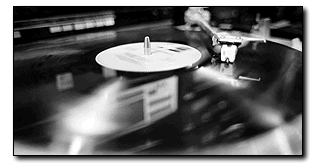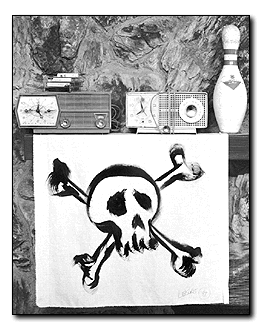![]()
![[ NEWS ]](/images/fall97/newsf97.gif)
![]()
By Greg Clark
Arizona Daily Wildcat December 5, 1997
Pirating KAMP Radio
![[Picture]](07_1_i.gif)
Chris Richards So you want to make radio waves? Better make sure you have the right supplies: two turntables, a microphone, a pirate flag and a real calling to bring music to all the late night listeners out there. |
In a central Tucson guesthouse, not far from the UA Campus, a fellow calling
himself Edwin Armstrong slides up the Channel 5 level on a homemade stereo
mixing board.
KAMP Student Radio, the University of Arizona's shoe-string student station, bursts onto Tucson's airwaves at 103.3 FM.
With a single motion, Armstrong fulfilled the goal 10 years of dedicated students has been striving for: to get student radio on the radio.
But there was an odd twist.
The broadcast was illegal.
It was a transmission of Radio Limbo, a pirate radio station that has been broadcasting on the self-assigned FM frequency in Tucson since June.
The broadcast violates federal law, which requires all radio broadcast stations to be licensed with the Federal Communications Commission.
The station broadcasts from a 20-watt transmitter Armstrong designed and built with electronics from a satellite TV converter box, old cellular phones and broken police radios he bought at thrift shops and surplus stores.

| Chris Richards Arizona Daily Wildcat |
"It was cobbled together out of random odds and ends and it is not very pretty but it broadcasts a clean signal," he said.
Radio Limbo can be heard through most of the Tucson area on any radio that has an antenna. About two dozen volunteer disc jockeys give Radio Limbo its voice, playing music from 6 p.m. to midnight on weekdays and noon to 2 a.m. on weekends.
With Radio Limbo empty during the day, Armstrong saw an opportunity to give KAMP the radio air it has been seeking since its inception, he said.
Last week he began taking KAMP's audio signal from TCI owned Tucson Cablevision Channel 60 and broadcasting it on Radio Limbo's frequency during the day.
Although not involved with KAMP or the UA, Armstrong said Radio Limbo and KAMP have parallel missions.
"KAMP certainly deserves a voice on the air. I thought I could do this to serve the students of the university community. It just boggles my mind that the UA has four radio transmitters and none of them is available to students."
The university operates KUAZ-FM, KUAT-AM and KUAT-FM, which broadcasts at two frequencies.
KAMP station manager Adlai Wilson, a geography senior, said he was surprised to find out KAMP could be heard on the FM dial.
"That is really strange," Wilson said. "The exposure is good, but because it is illegal, obviously we can't condone it."
Wilson added KAMP's signal is being used without the station's permission.

| Chris Richards Arizona Daily Wildcat |
KAMP's engineering director Phil Zeringue, an electrical engineering senior, said KAMP has no control over its signal once it leaves the KAMP studios.
"If he's taking us off cable and broadcasting it, it's the same as us broadcasting music from CD or record."
Wilson said the station has an antenna right now, but it is limited to broadcasting at less than one-third of a watt, making nearly inaudible at its 1570 AM frequency.
Zeringue said the FCC forbids KAMP from sending its signal at any level detectable off-campus.
But KAMP programmers have been more upbeat about being heard on the FM dial. Pharmacy junior Jose Mangin is a KAMP disc jockey who does a heavy metal show twice a week.
During his morning show Wednesday he got 4 phone calls from people who heard his program on 103.3 FM.
"I think it's bad ass," Mangin said.
"I'm trying to spread the metal message and the more audience the better. It was cool to have people hear it on FM," he said.
Armstrong, who designs computer circuitry for a living, became inspired to start a radio station five years ago, he said, but the cost of following traditional legal avenues was prohibitive.
Armstrong said he saw a need for a different kind of radio station, one without commercial goals that could be operated cheaply to provide alternative broadcasting and listening opportunities to the average person.
According to FCC documents, the application fee to apply for a radio license is $2,470.
In addition, Armstrong said, the FCC requires engineering studies which cost a minimum of $50,000.
KAMP adviser Chip West said the most significant cost a fledgling station may encounter is the transmitter.
A used 30-watt transmitter, the kind KAMP will need to be heard legally, costs a minimum of $100,000, West said.
Armstrong said that price was unjustifiably high.
"That is the problem with the radio industry," Armstrong said. "It is infused with so much money that the prices are inflated beyond reach. It doesn't cost anything to build one of these things," he said.
Armstrong said he built his entire station, transmitter included, for less than $2,000.
He culled amateur radio books from used bookstores and surplus shops and began building equipment to transmit a low-power FM signal.
Modifying second-hand home stereo equipment, Armstrong pieced together the components for Limbo's studio, which he set up in the guesthouse behind his home.
Limbo DJ Buster Amp plays a Tuesday night punk rock show on the air. He said the pirate station offers sound not available on government-sanctioned radio.
"If you're into punk rock, you're pretty screwed as far as radio goes," he said, "I just wish there were 50 stations like Radio Limbo."
The futures of KAMP and Radio Limbo are both uncertain.
Although KAMP hopes to be granted an FCC license eventually, actual radio broadcasts are years away, Zeringue said.
"It is not something that any of the students have the time, money or knowledge to do on their own," he said, explaining KAMP will need professional consultants and a budget much greater than the current $3,300 per year KAMP gets from the University Activities Board.
Last spring students voted in favor of paying a $1 per semester fee to support KAMP.
KAMP adviser Chip West said the Arizona Board of Regents must approve that fee before it goes into effect. The matter is scheduled for January's Regents meeting and funds may be available to support the station by next summer, West said.
On Jan. 1, Tucson Cablevision will drop KAMP's signal, leaving the station again without an audible broadcast.
That move is part of the new TCI/City of Tucson Cable Agreement that will eliminate six of the 13 public education and government channels TCI offers, said Jack Parris, assistant general manager for UA VideoServices.
Julie Hoover, a TCI spokeswoman, said the agreement will free up for space for commercial stations. In January, she said, the company will bring back Chicago-based WGN and pick up a 24-hour golf network.
Armstrong said that gives him a month to devise another way to get the KAMP signal.
Although his station is illegal, Armstrong said he thinks the FCC may look the other way.
The commission no longer operates a southern Arizona field office, he said, and usually will investigate violations only in response to complaints.
Armstrong said he designed Limbo's transmitter to meet all FCC standards of signal clarity. He built a signal filter to ensure the transmitter does not broadcast any stray signals that would interfere with other stations.
"That is the mark of a consciencious radio pirate," Armstrong said, "You have to make equipment that will not interfere with anyone else."
Right now, the FCC is in a court fight trying to shut down a similar pirate station in Berkeley, Calif.
That station's operator, Stephen Dunifer, is arguing that the government's ban on broadcasting low-power radio signals without a license violates the First Amendment's right to free speech.
Dunifer claims that the licensing process is so costly, that free speech is available only to the extremely rich.
Until the case is resolved, Armstrong said, the legality of his station is still open to question.
"The case leaves us in Limbo."
Radio Limbo can be heard from mid-morning to midnight on 103.3 FM.
Its web page Internet address is http://www.azstarnet.com/~limbo



